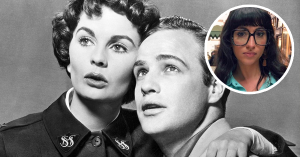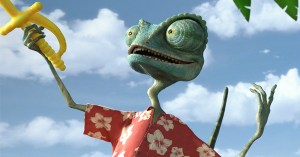Laura Linney on The Savages: The RT Interview
We talk the craft of acting with the Oscar nominee.
 A class act, Laura Linney‘s enviable list of big screen credits includes early roles as Jim Carrey‘s scary wife in The Truman Show and Clint Eastwood‘s daughter in Absolute Power, through to her own Oscar-nominated turns in intelligent dramas like You Can Count On Me and Kinsey.
A class act, Laura Linney‘s enviable list of big screen credits includes early roles as Jim Carrey‘s scary wife in The Truman Show and Clint Eastwood‘s daughter in Absolute Power, through to her own Oscar-nominated turns in intelligent dramas like You Can Count On Me and Kinsey.
Hailing from a theatrical background (her father is playwright Romulus Linney) and Juillard-trained, Linney, 43, can effortlessly switch between indie (The Squid and the Whale, Jindabyne) and mainstream (Primal Fear, Love, Actually) fare.
Her latest role – which has just garnered her third Oscar nod – sees her as a neurotic, wannabe playwright suddenly forced, along with her older brother (Philip Seymour Hoffman), to care for their ailing, estranged father in the blackly comic The Savages. RT sat down with Linney to learn more.
I’m sure you’ve thought about the issue of aging parents before but did making this film give you a different perspective on that issue?
Laura Linney: It certainly did make me think about it, there’s no question about that. And it prompted me to ask questions of the people I will be responsible for — solely responsible for. It’s that dreaded topic which is inevitable and knowing that I would be a mess when these people go, I said, “the biggest gift you can give me is to help me figure out what to do during that period of time. If we can talk about this while we’re all still healthy and have a sense of humour about it, then when I am grieving, I’ll still be able to function and know that I’m doing the right thing.”
So I guess in a way making a movie like this is really a step on that process because you’re putting this stuff out there…
LL: Yeah, it’s somewhat haunting, but I got some things in order. It will be a huge turning point in my life, as it will be for everybody, but I will always remember all of us laughing about it, which is a great thing. We had a real laugh trying to figure all this out!

In the film there’s a great dynamic between your character and your brother, which reminded me of another interesting sibling relationship from an earlier movie of yours, You Can Count On Me. Do you consciously compare roles when you see these connections?
LL: No, you don’t. I think people are curious because there have been two brother-sister movies and it’s not a relationship that is typically explored but I didn’t compare them at all. The situations are so different, the characters are so different. It’s the same thing as if I play a wife or a lawyer; I don’t compare them to each other.
LL: It was our first time.
– and you’re both so prolific and in-demand. Was it something you’d both always wanted to do?
LL: I was just thrilled when it was a possibility. I think we both wanted to work with each other, we’re both from a similar background, we have a similar philosophy about work and how to go about it, and so we were really well matched. And he’s a really good guy. I have enormous admiration for how he conducts his life and the decisions that he makes and how he conducts himself. He rocks, as far as I’m concerned. [laughs] He just rocks, that Phil Hoffman!
That should be the line on the poster!
LL: The whole review! “He Rocks!”

You’ve had a great roster of male co-stars — I’m thinking of Sean Penn in Mystic River, Liam Neeson in Kinsey, Gabriel Byrne in Jindabyne and many others. How do you feel these match-ups bring out the best in each of you?
LL: Well you always hope to work with someone better than you because they will push you in a way that nobody else can and you have to keep up. It’s like people who play tennis always say they prefer to play with someone who’s a better player.
I’ve worked with some fantastic people, and worked with several people multiple times: Liam twice, Richard Gere twice, Paul Giamatti twice, Gabriel three times. What that gives you is a foundation of trust and fun so that when you go back and do another job together, you can start where you left off. And the potential to go a little deeper and a little further is there.
There’s a lot of awards buzz around The Savages, particularly around the actors because they are such great roles. What’s your take on all that? Is it enjoyable or a distraction?
LL: You know, it’s very nice that people would even think that. That’s not bad, that must mean that the movie must not be bad! [laughs] Whether it happens or not, who knows? I’ve been fortunate enough to go through it and you certainly don’t forget that period of time; it’s fun and hilarious and overwhelming. You have to be careful about where you sort-of place it in your priority. You shouldn’t devalue it but at the same time you shouldn’t take it too seriously. But it’s a kick; it just is!

Presumably the best thing about it is that it allows you to keep working and do a better quality of work.
LL: Well you hope. But it depends, you know, for some people it will change their lives completely and propel them into a whole other stage of their career and for other people it will stop it dead in its tracks. So it’s not always a guarantee for future success. You don’t know how that will sit with someone.
And I still feel that the best way to go is to go and be nominated and not win. I think that’s pretty good!
Is that when you practice your “I’m-so-happy-for-the-winner” smile?
LL: Oh no, that’s relief, actually! [laughs] I can’t imagine if you actually had to go up there and make a speech, I’d be scared to death!





